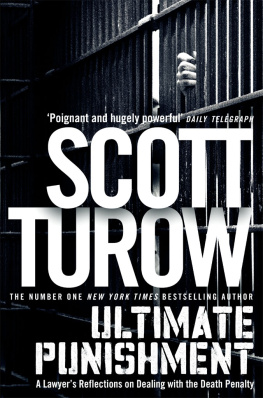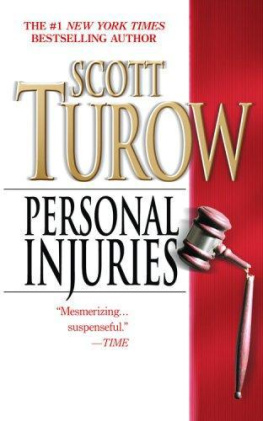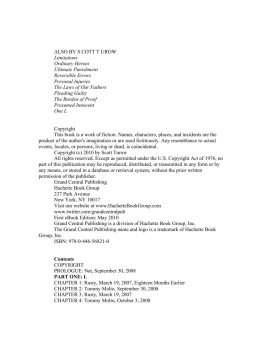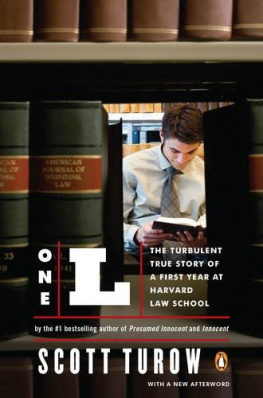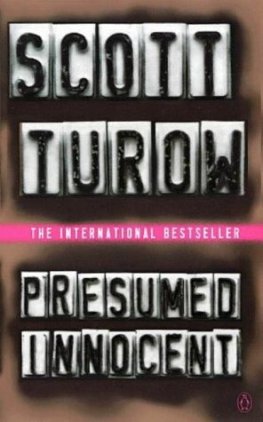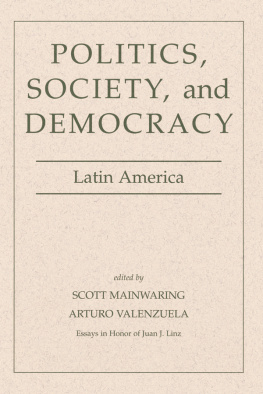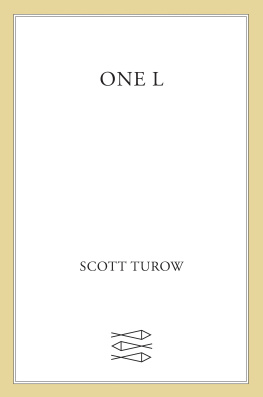Scott Turow - Ultimate Punishment
Here you can read online Scott Turow - Ultimate Punishment full text of the book (entire story) in english for free. Download pdf and epub, get meaning, cover and reviews about this ebook. year: 2011, publisher: Picador USA, genre: Detective and thriller. Description of the work, (preface) as well as reviews are available. Best literature library LitArk.com created for fans of good reading and offers a wide selection of genres:
Romance novel
Science fiction
Adventure
Detective
Science
History
Home and family
Prose
Art
Politics
Computer
Non-fiction
Religion
Business
Children
Humor
Choose a favorite category and find really read worthwhile books. Enjoy immersion in the world of imagination, feel the emotions of the characters or learn something new for yourself, make an fascinating discovery.
- Book:Ultimate Punishment
- Author:
- Publisher:Picador USA
- Genre:
- Year:2011
- Rating:5 / 5
- Favourites:Add to favourites
- Your mark:
- 100
- 1
- 2
- 3
- 4
- 5
Ultimate Punishment: summary, description and annotation
We offer to read an annotation, description, summary or preface (depends on what the author of the book "Ultimate Punishment" wrote himself). If you haven't found the necessary information about the book — write in the comments, we will try to find it.
Ultimate Punishment — read online for free the complete book (whole text) full work
Below is the text of the book, divided by pages. System saving the place of the last page read, allows you to conveniently read the book "Ultimate Punishment" online for free, without having to search again every time where you left off. Put a bookmark, and you can go to the page where you finished reading at any time.
Font size:
Interval:
Bookmark:

F OR FOUR FRIENDS WHO HAVE SHAPED MY LIFE AS A LAWYER
J EREMY M ARGOLIS
D UANE Q UAINI
T HOMAS P. S ULLIVAN
B ILL W ITKOWSKI

LAW AND MURDER : MICHELLE THOMPSON AND JEANINE NICARICO
O N FEBRUARY 3, 1984, a young woman named Michelle Thompson and a male friend, Rene Valentine, were forced at gunpoint from the car theyd just entered in a parking lot outside D. Laneys, a nightclub in Gurnee, Illinois, north of Chicago. The gunman walked Valentine a short distance, then shot him in the chest at point-blank range. When the police arrived, Michelle Thompson was gone.
I was an Assistant United States Attorney in Chicago at the time, and my oldest friend in the federal prosecutors office, Jeremy Margolis, helped direct the FBIs search for Thompson. Initially, the case appeared to be an interstate kidnapping, which is a federal matter. Within a few days, the crime proved to be one within the province of state authorities: murder. Beaten, raped, and strangled, Thompsons body was discovered in Wisconsin. Shortly thereafter, Hector Reuben Sanchez, an illiterate but ambitious factory worker and burglar, was arrested, along with an accomplice, Warren Peters, Jr., who ultimately agreed to testify against Sanchez.
Deeply enmeshed in the case by now, Jeremy was appointed a special Assistant States Attorney to help the local prosecutors try Sanchez in state court in Lake County, Illinois. As Jeremy prepared for trial, I spent hours listening to him describe Michelle Thompsons miserable final night. After Sanchez raped Thompson on the floor of the family room in his house, she escaped and dashed, still handcuffed and naked below the waist, through the snow to the back door of a neighbors, where she pleaded for help. Sanchez found her there and later assuaged the neighbor by telling him that Thompson was drunk and hysterical. The pathos of the neighbors account of the young woman being led away by Sanchez was heartbreaking. Michelle Thompson had been abused now for several hours, and she offered no further resistance. She was resigned to being tortured and degraded, and hoped only to livea meager, abased wish that went unfulfilled. Back in his house, Sanchez gagged Michelle Thompson with a strip of cloth, bent her over a washing machine and sodomized her, then strangled her with a nylon strap and a coat hanger. He finished the job by beating her head on the basement floor.
In pursuing the case, the FBI had discovered that nine years earlier Sanchez had murdered his girlfriend, slashing her throat and shooting her, then escaped prosecution by threatening the witnesses. This time Jeremy and the Lake County States Attorneys were determined that there would be no repetitions. They were seeking the death penalty.
Through Jeremy, I followed the progress of the case closely. Late in the summer, he and Ray McKoski, then the First Assistant States Attorney in Lake County, proceeded to trial in Waukegan, Illinois. When Sanchez was convicted and sentenced to death in September 1984, I relished their victory.
That sideline experience remained my only direct exposure to capital prosecutions until 1991, when I was asked to take on the pro bono appeal of Alejandro Hernandez. By then I was in private practice as a partner in the Chicago office of Sonnenschein Nath and Rosenthal, a large national firm. Id known of Hernandez for nearly a decade by now as a co-defendant in what the press commonly referred to as The Case That Broke Chicagos Heart. On February 25, 1983, Patricia Nicarico, who worked as a school secretary in Naperville, a suburb outside Chicago, had returned home to discover that her front door had been kicked in and that her ten-year-old daughter, Jeanine, was missing. Two days later, the girls body, blindfolded and otherwise clad only in a nightshirt, was found in a nearby nature preserve. She had died as the result of repeated blows to the head, administered only after she had been sexually assaulted in a number of ways. More than forty law enforcement officers joined a multi-jurisdictional task force organized to hunt down the killer, for whose capture a $10,000 reward was offered.
By early 1984, the case had still not been solved, and a heated primary campaign was under way for the job of States Attorney in DuPage County. A few days before the primary, on March 6, 1984, Alex Hernandez, Rolando Cruz, and Stephen Buckley were indicted, even though six weeks earlier the States Attorney had said that there was insufficient evidence to indict anyone.
James Ryan won the election and became the new DuPage County States Attorney. (Ryan was elected Attorney General of Illinois in 1994 and served until early 2003, after losing in the November 2002 election, when he was the Republican candidate for Governor.) Ryans new office took the case against the three defendants to trial in January 1985. The jury deadlocked on Buckley, but Hernandez and Cruz were both convicted and sentenced to death. There was no physical evidence against either of themno blood, semen, fingerprints, hair, fiber, or other forensic proof. The states case consisted solely of each mans statements, a contradictory maze of mutual accusations and demonstrable falsehoods as testified to by various informants and police officers. By the time the case reached me, seven years after Hernandez and Cruz were first arrested, the Illinois Supreme Court, in 1988, had reversed the original convictions and ordered separate retrials. Cruz was convicted and sentenced to death again in April 1990. The jury hung in Hernandezs second trial, but the state put him on trial for his life a third time in May 1991. He was found guilty but sentenced to eighty years, rather than to execution.
When Hernandezs trial lawyers, Mike Metnick, Jeff Urdangen, and Jane Raley, approached me, they made a straightforward pitch. Their client was innocent. I didnt believe it. I knew how the system worked. Convict an innocent man once? Not likely, but possible. Twice? Never. And even if it were true, I couldnt envision convincing an appeals court to overturn the conviction a second time. Illinois elects its state court judges, and this was a celebrated child murder.
The lawyers begged me to read the brief that Larry Marshall, a renowned professor of criminal law at Northwestern University, had filed in behalf of Cruz, and to look at the transcripts of Hernandezs trials. By the time I had done this, six weeks later, I knew I had to take the case or stop calling myself a lawyer. Alex Hernandez was innocent.
In June 1985, a few months after Hernandez and Cruz were first convicted, another little girl, Melissa Ackerman, age seven, was abducted and murdered in LaSalle County, about an hours drive from Jeanine Nicaricos house. Both Melissa and Jeanine were kidnapped in broad daylight, carried away in blankets, sodomized, and murdered in a wooded area. A man named Brian Dugan was arrested for Melissas murder. In the course of complex plea discussions, his lawyer said that Dugan was prepared to plead guilty not only to the Ackerman killing but to a host of other crimes, including raping and killing two more females. One of the additional women Dugan was prepared to admit he killed was a twenty-seven-year-old nurse named Donna Schnorr. The other was Jeanine Nicarico.
The prosecutors from DuPage County were contacted and invited to question Dugan, through his attorney. The First Assistant, Robert Kilander, and a younger prosecutor met with Dugans lawyer, but after returning to their office, they refused to accept Dugans statements or to deal with him further. (Nor did anyone from the DuPage office inform the lawyers for Cruz and Hernandez that another man was prepared to admit to the murder for which their clients were then awaiting execution.)
Next pageFont size:
Interval:
Bookmark:
Similar books «Ultimate Punishment»
Look at similar books to Ultimate Punishment. We have selected literature similar in name and meaning in the hope of providing readers with more options to find new, interesting, not yet read works.
Discussion, reviews of the book Ultimate Punishment and just readers' own opinions. Leave your comments, write what you think about the work, its meaning or the main characters. Specify what exactly you liked and what you didn't like, and why you think so.

